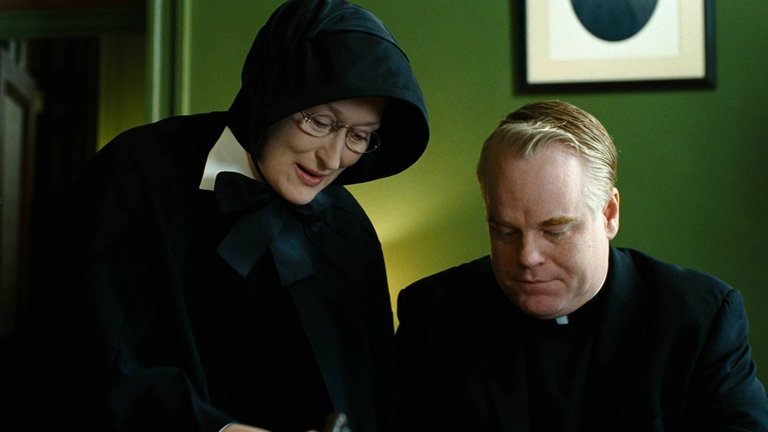Film Review: Doubt (2008)

The symbiotic relationship between Hollywood and the Catholic Church has historically been characterised by a mutual dependency, where the Church often received favourable portrayals in films, while Hollywood shied away from controversial issues that could tarnish its image. However, as we entered the 21st century, cultural shifts began to reshape this landscape. Younger generations increasingly viewed religion as less relevant or "cool," prompting Hollywood to reassess compatibility of its own predominantly liberal and progressive mindset with the conservative mores of the Church. This shift allowed for a more critical examination of Catholicism in cinematic narratives. One significant film that emerged from this new wave of storytelling is Doubt, a 2008 period drama penned and directed by John Patrick Shanley.
Doubt is adapted from Shanley’s acclaimed 2006 stage play, which garnered both the Pulitzer Prize and the Tony Award. Set against the backdrop of 1964 Bronx, Doubt opens with Father Brendan Flynn (played by Philip Seymour Hoffman), a progressive young priest who posits that doubt can serve as a unifying force alongside faith during a Mass. He finds himself at odds with Sister Aloysius (played by Meryl Streep), a strict traditionalist and head of the parish school, who embodies an unwavering commitment to discipline and order. Their ideological clash is further complicated by Sister James (played by Amy Adams), a more naive young nun who begins to suspect inappropriate behaviour between Flynn and Donald Miller (played by Joseph Foster), the school’s first black student and new altar boy. This Sister Aloysius to initiate a personal investigation aimed at uncovering the truth. The tension mounts as Flynn vehemently denies any wrongdoing, while Mrs. Miller (played by Viola Davis), boy’s mother, provides crucial insights that shift the perspective on the matter.
Released towards the end of 2008, Doubt was positioned as an Oscar contender, leveraging its theatrical roots to rely heavily on powerful performances—a strategy that typically resonates with Academy voters. The film features an exceptionally talented cast, with Streep, Hoffman, Adams, and Davis all receiving nominations for their roles. Despite this acclaim, Doubt notably failed to secure a nomination for Best Picture, an unusual outcome for a film celebrated for its acting prowess.
While Doubt is undoubtedly a showcase of exceptional acting talent, it also serves as a platform for exploring social issues that resonate with Academy voters—issues such as racism, sexism, and homophobia. Shanley’s narrative engages with these themes without becoming overly didactic; he presents them through the lens of personal conflict and moral ambiguity rather than overt moralising.
To his credit, Shanley avoids heavy-handedness by presenting red herrings that challenge audience expectations. Father Flynn is not portrayed as a creepy pervert; instead, he emerges as a modern and compassionate figure genuinely invested in his parishioners' welfare, including young Donald. In contrast, Sister Aloysius is depicted as an ultra-conservative antagonist driven by jealousy and a rigid adherence to tradition. This inversion of typical character tropes adds depth to their interactions and raises questions about authority and morality within the Church.
However, while the film excels in character development and performance, it falters in its resolution. The plot culminates in twists that feel overly convenient, leaving viewers with an ambiguous ending that may evoke frustration rather than satisfaction.
Moreover, setting the story in the past diminishes much of its dramatic weight. The patriarchal structures within the Church remain prevalent today; thus, Sister Aloysius's struggle against Father Flynn feels even more quixotic in 1960s. Even if she had successfully proven her accusations, historical evidence suggests there would have been minimal repercussions for Flynn due to societal attitudes toward such scandals at that time. As a result, Doubt may appear less convincing when viewed through a contemporary lens.
Ultimately, while Doubt deserves recognition for its outstanding performances—particularly those of Streep and Hoffman—it falls short in delivering a compelling narrative that resonates beyond its immediate themes.
RATING: 5/10 (++)
Blog in Croatian https://draxblog.com
Blog in English https://draxreview.wordpress.com/
InLeo blog https://inleo.io/@drax.leo
Hiveonboard: https://hiveonboard.com?ref=drax
Rising Star game: https://www.risingstargame.com?referrer=drax
1Inch: https://1inch.exchange/#/r/0x83823d8CCB74F828148258BB4457642124b1328e
BTC donations: 1EWxiMiP6iiG9rger3NuUSd6HByaxQWafG
ETH donations: 0xB305F144323b99e6f8b1d66f5D7DE78B498C32A7
BCH donations: qpvxw0jax79lhmvlgcldkzpqanf03r9cjv8y6gtmk9
Hello.
There is reasonable evidence that this article has been re-written after being machine-generated.
We would appreciate it if you could avoid publishing AI-generated content (full or partial texts, art, etc.).
Thank you.
Guide: AI-Generated Content = Not Original Content
If you believe this comment is in error, please contact us in #appeals in Discord.